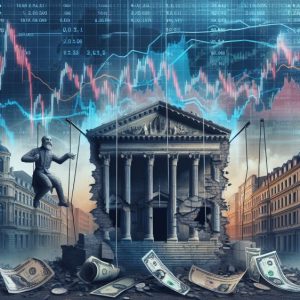
March 29, 2024
The world of stock markets is an enticing blend of numbers, trends, and human behaviour. It’s a sphere where mass psychology plays a crucial role, shaping the rise and fall of stocks in exciting ways. Often seen as an economic health barometer, the stock market mirrors collective human psychology. Mass psychology is when group sentiments and behaviours influence individual actions and market outcomes.
The Role of Mass Psychology in Market Movements
Mass psychology, an intriguing facet of human behaviour, can ignite considerable shifts in the stock market. With its ever-fluctuating numbers and trends, the stock market is essentially a psychological playground. Every rise and fall, every bull and bear market, is a testament to the powerful sway of collective human sentiment.
Bull markets, characterized by rising prices and widespread optimism, are born from a shared belief in a prosperous future. Investors buoyed by positive economic indicators or promising company news buy stocks. This increased demand pushes stock prices upward, creating a self-perpetuating cycle of optimism and investment. The driving force behind this cycle is a universal human emotion: greed. But it’s not the harmful greed we associate with avarice or selfishness. It’s a more benign form of greed that fuels ambition, inspires risk-taking, and encourages participation in the market.
However, the same forces that fuel bull markets can also trigger their downfall. When the winds of sentiment shift and the market begins to fall, investors respond with fear. Fear, like greed, is a powerful motivator. It can make people act irrationally, make hasty decisions, and overlook important details. This fear drives investors to sell their stocks in a bear market, hoping to avoid further losses. This mass selling amplifies the market downturn, leading to a vicious cycle of fear and selling.
Understanding the role of mass psychology in market movements is crucial for any investor. It’s the key to recognizing market trends, anticipating shifts, and making informed investment decisions. It’s about reading the market’s mood, interpreting the signals of mass sentiment, and understanding how fear and greed can drive the market in unexpected directions.
The stock market isn’t just about numbers and charts. It’s a complex psychological landscape where collective sentiment can dramatically sway the market. By understanding the role of mass psychology, investors can better navigate this landscape and make intelligent investment decisions.
Historical Evidence of Mass Psychology’s Impact
The impact of mass psychology on the stock market isn’t just theoretical; it’s a phenomenon that has shaped the course of financial history. The pages of our past are riddled with instances where the collective psyche of investors has led to significant market events. Let’s examine two most prominent examples: the dot-com bubble and the global financial crisis of 2008.
The late 1990s saw an unprecedented surge in internet-related stocks, leading to what we now refer to as the dot-com bubble. The internet was a relatively new and exciting frontier, and investors, enchanted by its potential, began pouring money into related stocks. This mass optimism inflated stock prices well beyond their actual value, causing what we now recognize as an economic bubble.
However, like all bubbles, it eventually burst. When investors realized that many internet companies were overvalued and underperforming, panic ensued. Fear replaced optimism, and the market plunged into a sell-off frenzy, leading to a sharp market downturn. The dot-com bubble is a stark reminder of how mass psychology can fuel unsustainable market trends and trigger financial crashes.
Fast forward to 2008, and we witness another powerful display of mass psychology in the global financial crisis. This time, it was fear that held the reins. The potential collapse of major financial institutions triggered widespread panic. Fearing the worst, investors sold off their stocks, leading to one of the most severe economic crises in history.
Yet, it’s important to remember that mass psychology doesn’t just fuel market volatility; it also creates opportunities. In the wake of these crises, astute investors who understood mass psychology dynamics could identify undervalued stocks and make profitable investments. By recognizing mass psychology’s influence, they could navigate the storm and emerge on the other side with gains.
The lessons from the dot-com bubble and the 2008 financial crisis underline the profound impact of mass psychology on the stock market. They remind us that understanding this powerful force is critical to making informed and successful investment decisions.
Contrarian Investing and Mass Psychology
In the vast chessboard of the stock market, contrarian investors are the players who dare to move against the tide. They are the ones who see opportunity in the face of mass pessimism and caution amid widespread optimism. This contrarian approach is deeply rooted in understanding the psychological dynamics of the market.
Contrarian investing is an investment strategy that involves going against prevailing market trends. When the majority of investors are buying, contrarian investors sell. When most are selling, contrarians buy. This strategy is predicated on believing that crowd behaviour can lead to overpriced or underpriced stocks, creating profit opportunities.
This approach can be advantageous. For instance, during the financial crisis 2008, while many investors were scrambling to sell their stocks, contrarian investors were buying. They recognized that the fear gripping the market had led to undervalued stocks. When the market eventually recovered, these contrarian investors reaped substantial profits.
However, contrarian investing is not without its risks. It requires a thorough understanding of the market, a high tolerance for risk, and the courage to stand against the crowd. It’s not a strategy for the faint-hearted or the uninformed. Timing is also crucial; buying too early or selling too late can lead to significant losses.
Moreover, contrarian investing is not just about going against the crowd; it’s about understanding why the crowd behaves the way it does. It’s about recognizing the psychological forces and making informed decisions based on that understanding.
To succeed as a contrarian investor, one must understand the market’s psychological dynamics and their own. They must control their emotions, resist herd mentality, and maintain a long-term perspective.
Contrarian investing, fueled by an understanding of mass psychology, can be a powerful strategy. While it is not suited to everyone, for those who master it, it can provide significant returns and a unique perspective on the market.
Conclusion: The Continuing Impact of Mass Psychology
Mass psychology plays a leading role in the stock market’s grand theatre. The invisible hand guides the market’s trajectory, steering it through peaks and troughs. Its impact is profound and enduring, shaping market trends and influencing individual investment decisions.
With its potent mix of fear and greed, mass psychology can create and burst financial bubbles. It can send markets into frenzied rallies or plunge them into panicked sell-offs. The dot-com bubble and the 2008 financial crisis are stark reminders of its power to drive market volatility. However, it’s vital to remember that this same power also presents opportunities.
For contrarian investors, the psychological undercurrents of the market are a treasure trove of insight. By understanding and acting against the prevailing market sentiment, these investors can uncover valuable investment opportunities. They are the ones who buy when everyone else is selling and sell when everyone else is buying. They are the ones who see the market not as a monolith but as a complex psychological landscape to be navigated with care.
But regardless of the investment strategy one chooses, understanding the impact of mass psychology on the stock market is indispensable. It provides a lens through which to view market trends, a compass to navigate market shifts, and a tool to make informed investment decisions.
As we move forward, the influence of mass psychology on the stock market will continue to be significant. After all, the stock market is a human institution driven by human decisions and emotions. As long as this remains the case, the role of mass psychology will be integral to its functioning.
Investors who recognize this, who understand the psychological forces at play, will be better equipped to navigate the market’s volatile waters. They will be the ones who not only survive but thrive in the captivating world of the stock market.
Lost in Thought: Stimulating Perspectives

The Art of Portfolio Agility: Mastering the Tactical Asset Allocation Strategy

Stock Market Forecast for Tomorrow: Ignore Noise, Focus on the Trend

Defying the Crowd: Exploring the Stock Market Fear Index

Crowd Behavior Psychology: Deciphering, Mastery, and Success

Inflation vs Deflation vs Stagflation: Strategies for Triumph

What Is The Best Way For One To Recover After a Financial Disaster?

The Psychology of Investing: Shifting Focus from the Crowd to the Trend

What Development In The Late 1890s May Well Have Prevented Another Financial Disaster?

Mass Psychology of Stocks: Ride the Wave to Win

How Inflation Erodes Debt and Strategies for Smart Investing

Demystifying StochRSI Strategy: Easy Strategies for Winning

From Rags to Riches: Stock Market Investing Success Stories

Winning the loser’s game: timeless strategies for successful investing

Stock Market Crash Recession Is A Done Deal: Wishful Thinking



